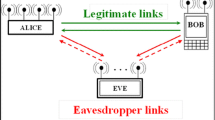Abstract
In searching for alternative solutions of secret key generation in wireless networks, many physical-layer-based methods have been proposed. These methods exploit the inherent randomness and reciprocity of the multipath fading channel to generate secret keys. Multiple-antenna system provide higher key bit generation rate than single-antenna one because of more channel randomness. However, traditional MIMO key generation schemes produce prohibitively high bit mismatch. To address the tradeoff between key bit generation rate and key agreement probability, we propose a compressed sensing (CS) method for key generation in single carrier MIMO sparse multipath channel. Theory analysis shows that the CS-based key generation scheme provides high entropy key bits from fewer probes. Performance simulation reveals the proposed scheme achieves a high key agreement probability at a high key generation rate.
Access this chapter
Tax calculation will be finalised at checkout
Purchases are for personal use only
Similar content being viewed by others
References
Limmanee A, Henkel W (2010) Secure physical-layer key generation protocol and key encoding in wireless communications. In: GLOBECOM workshops IEEE, pp 94–98
Ren K, Su H, Wang Q (2011) Secret key generation exploiting channel characteristics in wireless communications. Wirel Commun IEEE 18(4):6–12
Kai Z, Wu D, An C, Mohapatra P (2010) Exploiting multiple-antenna diversity for shared secret key generation in wireless networks. In: Proceedings of INFOCOM’10, pp 1837–1845
Wallace JW, Sharma RK (2010) Experimental investigation of MIMO reciprocal channel key generation. Communications (ICC) IEEE international conference IEEE, pp 1–5
Bajwa WU, Haupt J, Sayeed AM, Nowak R (2010) Compressed channel sensing: a new approach to estimating sparse multipath channels. Proc IEEE 98(6):1058–1076
Jana S, Premnath SN, Clark M et al (2009) On the effectiveness of secret key extraction from wireless signal strength in real environments. In: Proceedings of the 15th annual international conference on mobile computing and networking ACM, pp 321–332
Suhas M, Narayan M, Chunxuan Y, Alex R (2008) Radio-telepathy: extracting a secret key from an unauthenticated wireless channel. In: Proceedings of the 14th ACM international conference on mobile computing and networking. ACM, pp 128–139
Babak A, Alejandra M, Bulent Y et al (2007) Robust key generation from signal envelopes in wireless networks. In: Proceedings of the 14th ACM conference on computer and communications security. ACM, pp 401–410
Gilles B, Louis S (1994) Secret key reconciliation by public discussion. Lect Notes Comput Sci 765:410–423
Impagliazzo R, Leonid AL, Michael L (1989) Pseudo-random generation from one-way functions. In: Proceedings of the twenty-first annual ACM symposium on theory of computing. ACM, pp 12–24
Needell D, Joel AT (2009) CoSaMP: iterative signal recovery from incomplete and inaccurate samples. Appl Comput Harmon Anal 26(3):301–321
Author information
Authors and Affiliations
Corresponding author
Editor information
Editors and Affiliations
Rights and permissions
Copyright information
© 2015 Springer International Publishing Switzerland
About this paper
Cite this paper
Li, Y., Jiang, T., Huang, J. (2015). Compressed Sensing Method for Secret Key Generation Based on MIMO Channel Estimation. In: Mu, J., Liang, Q., Wang, W., Zhang, B., Pi, Y. (eds) The Proceedings of the Third International Conference on Communications, Signal Processing, and Systems. Lecture Notes in Electrical Engineering, vol 322. Springer, Cham. https://doi.org/10.1007/978-3-319-08991-1_44
Download citation
DOI: https://doi.org/10.1007/978-3-319-08991-1_44
Publisher Name: Springer, Cham
Print ISBN: 978-3-319-08990-4
Online ISBN: 978-3-319-08991-1
eBook Packages: EngineeringEngineering (R0)




